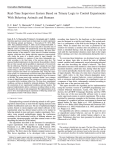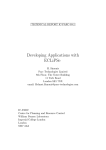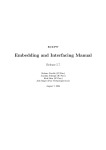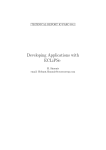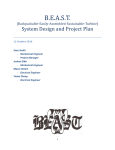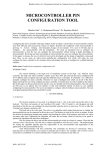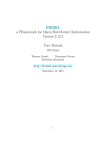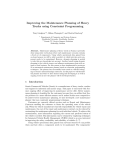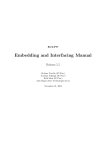Download An Introduction to Constraint (Logic) Programming Using ECLiPSe
Transcript
ECLi PSe CLP
Stefano
Benedettini
Scope and
Motivations
Prolog as a
Constraint
Solver
ECLi PSe
Extensions to
Prolog
An Introduction to Constraint (Logic)
Programming Using ECLi PSe
Syntactic Facilities
Iteration Constructs
Modules
Constraint
Satisfaction
with ECLi PSe
The Interval
Constraints Library:
ic
Search and
Optimization with
i
e
ECL PS
Other Constraint
Libraries
Stefano Benedettini
DEIS - Dipartimento di Elettronica Informatica e Sistemistica
University Bologna, Second Faculty of Engineering
Artificial Intelligence 2010
Outline
ECLi PSe CLP
Stefano
Benedettini
Scope and
Motivations
Prolog as a
Constraint
Solver
ECLi PSe
Extensions to
Prolog
1
Prolog as a Constraint Solver
2
ECLi PSe Extensions to Prolog
Syntactic Facilities
Iteration Constructs
Modules
3
Constraint Satisfaction with ECLi PSe
The Interval Constraints Library: ic
Search and Optimization with ECLi PSe
Other Constraint Libraries
Syntactic Facilities
Iteration Constructs
Modules
Constraint
Satisfaction
with ECLi PSe
The Interval
Constraints Library:
ic
Search and
Optimization with
i
e
ECL PS
Other Constraint
Libraries
Topics
ECLi PSe CLP
Stefano
Benedettini
Scope and
Motivations
Prolog as a
Constraint
Solver
ECLi PSe
Extensions to
Prolog
Syntactic Facilities
Iteration Constructs
Modules
Constraint
Satisfaction
with ECLi PSe
The Interval
Constraints Library:
ic
Search and
Optimization with
i
e
ECL PS
Other Constraint
Libraries
Constraint Logic Programming (CLP)
ECLi PSe constraint solver
Search methods for CLP (hints)
Objectives
ECLi PSe CLP
Stefano
Benedettini
Scope and
Motivations
Prolog as a
Constraint
Solver
ECLi PSe
Extensions to
Prolog
Syntactic Facilities
Iteration Constructs
Modules
Constraint
Satisfaction
with ECLi PSe
The Interval
Constraints Library:
ic
Search and
Optimization with
i
e
ECL PS
Other Constraint
Libraries
Re-discover Prolog as a constraint solver
Familiarize with ECLi PSe and its extensions to standard
Prolog
Get a grasp of Constraint Logic Programming
Learn how to model problems in ECLi PSe
Use constraint libraries
. . . have fun with the solver
Objectives
ECLi PSe CLP
Stefano
Benedettini
Scope and
Motivations
Prolog as a
Constraint
Solver
ECLi PSe
Extensions to
Prolog
Syntactic Facilities
Iteration Constructs
Modules
Constraint
Satisfaction
with ECLi PSe
The Interval
Constraints Library:
ic
Search and
Optimization with
i
e
ECL PS
Other Constraint
Libraries
Re-discover Prolog as a constraint solver
Familiarize with ECLi PSe and its extensions to standard
Prolog
Get a grasp of Constraint Logic Programming
Learn how to model problems in ECLi PSe
Use constraint libraries
. . . have fun with the solver
ECLi PSe CLP
Method
Stefano
Benedettini
Scope and
Motivations
Prolog as a
Constraint
Solver
ECLi PSe
Extensions to
Prolog
Syntactic Facilities
Laboratory lessons will follow a hands-on approach
During lessons you are supposed to experiment with
tools and techniques
Few novel theoretical concepts will be introduced
Iteration Constructs
Modules
Constraint
Satisfaction
with ECLi PSe
The Interval
Constraints Library:
ic
Search and
Optimization with
i
e
ECL PS
Other Constraint
Libraries
In order to make the most out of these lessons you should:
Have a fair theoretical background (i.e., study stuff you
saw during classes)
Explore new technologies on your own (documentations,
tutorials, websites)
Be productive as soon as possible
ECLi PSe CLP
Method
Stefano
Benedettini
Scope and
Motivations
Prolog as a
Constraint
Solver
ECLi PSe
Extensions to
Prolog
Syntactic Facilities
Iteration Constructs
Modules
Constraint
Satisfaction
with ECLi PSe
The Interval
Constraints Library:
ic
Search and
Optimization with
i
e
ECL PS
Other Constraint
Libraries
Laboratory lessons will follow a hands-on approach
During lessons you are supposed to experiment with
tools and techniques
Few novel theoretical concepts will be introduced
In order to make the most out of these lessons you should:
Have a fair theoretical background (i.e., study stuff you
saw during classes)
Explore new technologies on your own (documentations,
tutorials, websites)
Be productive as soon as possible
. . . anything else?
Method
ECLi PSe CLP
Stefano
Benedettini
Scope and
Motivations
Prolog as a
Constraint
Solver
ECLi PSe
Extensions to
Prolog
Laboratory lessons will follow a hands-on approach
During lessons you are supposed to experiment with
tools and techniques
Few novel theoretical concepts will be introduced
Syntactic Facilities
Iteration Constructs
Modules
Constraint
Satisfaction
with ECLi PSe
The Interval
Constraints Library:
ic
Search and
Optimization with
i
e
ECL PS
Other Constraint
Libraries
In order to make the most out of these lessons you should:
Have a fair theoretical background (i.e., study stuff you
saw during classes)
Explore new technologies on your own (documentations,
tutorials, websites)
Be productive as soon as possible
Ah, of course! You should have fun!
Outline
ECLi PSe CLP
Stefano
Benedettini
Scope and
Motivations
Prolog as a
Constraint
Solver
ECLi PSe
Extensions to
Prolog
1
Prolog as a Constraint Solver
2
ECLi PSe Extensions to Prolog
Syntactic Facilities
Iteration Constructs
Modules
3
Constraint Satisfaction with ECLi PSe
The Interval Constraints Library: ic
Search and Optimization with ECLi PSe
Other Constraint Libraries
Syntactic Facilities
Iteration Constructs
Modules
Constraint
Satisfaction
with ECLi PSe
The Interval
Constraints Library:
ic
Search and
Optimization with
i
e
ECL PS
Other Constraint
Libraries
ECLi PSe CLP
Premises
Stefano
Benedettini
Scope and
Motivations
Prolog as a
Constraint
Solver
ECLi PSe
Extensions to
Prolog
Syntactic Facilities
Iteration Constructs
Modules
Constraint
Satisfaction
with ECLi PSe
The Interval
Constraints Library:
ic
Search and
Optimization with
i
e
ECL PS
Other Constraint
Libraries
During this course a good understanding of Prolog will
be assumed
You all followed Viroli’s course so you’ll probably know
Prolog better than me anyway. . .
We will use fancy stuff like custom operators and structures
We won’t use fancier stuff like metaprogramming
Though you’re free to explore by yourselves
ECLi PSe CLP
Tools of the Trade
Stefano
Benedettini
Scope and
Motivations
Prolog as a
Constraint
Solver
ECLi PSe
Extensions to
Prolog
Syntactic Facilities
Iteration Constructs
At this point any Prolog implementation will do
But we will abandon the usual Prolog fairly soon
You’d better start with ECLi PSe right away
Modules
Constraint
Satisfaction
with ECLi PSe
The Interval
Constraints Library:
ic
Search and
Optimization with
i
e
ECL PS
Other Constraint
Libraries
http://eclipse-clp.org/
Resources for ECLi PSe
ECLi PSe CLP
Stefano
Benedettini
Scope and
Motivations
Prolog as a
Constraint
Solver
ECLi PSe
Extensions to
Prolog
1
ECLi PSe main site http://eclipse-clp.org/
2
http://eclipse-clp.org/examples
Keep your friends close but your documentation closer:
Syntactic Facilities
Iteration Constructs
3
Modules
http://eclipse-clp.org/doc (we will use that in
due time)
Constraint
Satisfaction
with ECLi PSe
The Interval
Constraints Library:
ic
Search and
Optimization with
i
e
ECL PS
Other Constraint
Libraries
4
Introductory book on CP using ECLi PSe : Constraint Logic
Programming Using ECLi PSe
ECLi PSe CLP
Stefano
Benedettini
Resources for Constraint Programming in
General
Scope and
Motivations
Prolog as a
Constraint
Solver
ECLi PSe
Extensions to
Prolog
Syntactic Facilities
Iteration Constructs
Modules
Constraint
Satisfaction
with ECLi PSe
The Interval
Constraints Library:
ic
Search and
Optimization with
i
e
ECL PS
Other Constraint
Libraries
CS problems and models in various languages:
http://www.csplib.org/
Gecode: THE C++ library for CP (not for the faint of
heart)
Guido Tack’s Ph.D. dissertation (for a challenge)
Java library: http://jacop.osolpro.com/
Python library (proprietary):
http://www.eveutilities.com/products/emma
Python library (GPL):
http://labix.org/python-constraint
ECLi PSe CLP
Stefano
Benedettini
Resources for Constraint Programming in
General
Scope and
Motivations
Prolog as a
Constraint
Solver
ECLi PSe
Extensions to
Prolog
Syntactic Facilities
Iteration Constructs
Modules
Constraint
Satisfaction
with ECLi PSe
The Interval
Constraints Library:
ic
Search and
Optimization with
i
e
ECL PS
Other Constraint
Libraries
Comet language:
http://dynadec.com/support/downloads/ (keep
an eye on this)
On-line guide to CP by Roman Bartak
...and much more!
A blog on CP (serious stuff)
Mapping CSPs in Prolog
ECLi PSe CLP
Stefano
Benedettini
Scope and
Motivations
Prolog as a
Constraint
Solver
ECLi PSe
Extensions to
Prolog
What we would like to do
Setup variables and domains
State constraints
Specify a search strategy
Syntactic Facilities
Iteration Constructs
Modules
Constraint
Satisfaction
with ECLi PSe
The Interval
Constraints Library:
ic
Search and
Optimization with
i
e
ECL PS
Other Constraint
Libraries
What Prolog has to offer
Logic variables and closed world assumption
Predicates can be seen as very basic form of constraint
Backtracking for free
What Prolog lacks
Constraint propagation ⇒ Efficiency!
Constraints and variables are not first-class citizens
Constraints in Prolog
ECLi PSe CLP
Stefano
Benedettini
Scope and
Motivations
Prolog as a
Constraint
Solver
ECLi PSe
Extensions to
Prolog
Syntactic Facilities
Any predicate is really a constraint
Example
member(X, [X|_]).
member(X, [_|T]) :- member(X, T).
Iteration Constructs
Modules
Constraint
Satisfaction
with ECLi PSe
p(X, X).
p(X, 3).
The Interval
Constraints Library:
ic
:- member(X, [1, 2, 3, 4]), X > 2.
Search and
Optimization with
i
e
ECL PS
yields X = 3, X = 4, while
Other Constraint
Libraries
:- member(X, [1, 2, 3, 4]), member(Y, [2, 3, 4, 5]),
p(X, Y).
yields (X, Y) = (1, 3), (2, 2), (2, 3), (3, 3), (3, 3), (4, 3), (4, 4)
ECLi PSe CLP
Do Constraints in Prolog Really Work. . . ?
Stefano
Benedettini
Scope and
Motivations
Example
Prolog as a
Constraint
Solver
How about these?
ECLi PSe
Extensions to
Prolog
:- X > 3, X < 2. % clearly inconsistent
:- 4 is X + 3. % clearly X = 1
Syntactic Facilities
Iteration Constructs
Modules
Constraint
Satisfaction
with ECLi PSe
The Interval
Constraints Library:
ic
Search and
Optimization with
i
e
ECL PS
Other Constraint
Libraries
Both raise an “Instantiation fault” error
Non-logical predicates and closed world assumption are
Prolog greatest weaknesses
Variables in arithmetic predicates must be instantiated
(else error)
For which values the second query is satisfied? For
none, because you never told Prolog that 1 + 3 is true
ECLi PSe CLP
Do Constraints in Prolog Really Work. . . ?
Stefano
Benedettini
Scope and
Motivations
Example
Prolog as a
Constraint
Solver
How about these?
ECLi PSe
Extensions to
Prolog
:- X > 3, X < 2. % clearly inconsistent
:- 4 is X + 3. % clearly X = 1
Syntactic Facilities
Iteration Constructs
Modules
Constraint
Satisfaction
with ECLi PSe
The Interval
Constraints Library:
ic
Search and
Optimization with
i
e
ECL PS
Other Constraint
Libraries
Both raise an “Instantiation fault” error
Non-logical predicates and closed world assumption are
Prolog greatest weaknesses
Variables in arithmetic predicates must be instantiated
(else error)
For which values the second query is satisfied? For
none, because you never told Prolog that 1 + 3 is true
. . . The Answer Is: “So So”
ECLi PSe CLP
Stefano
Benedettini
Scope and
Motivations
Prolog as a
Constraint
Solver
ECLi PSe
Extensions to
Prolog
Consequences
Constraints can only be tested for satisfiability
There is no “constraint propagation” (domain reduction)
Prolog natively supports only generate and test!
Syntactic Facilities
Iteration Constructs
Modules
Constraint
Satisfaction
with ECLi PSe
The Interval
Constraints Library:
ic
Search and
Optimization with
i
e
ECL PS
Other Constraint
Libraries
CSP in Prolog
solve_problem(Variables) :declare_domains(Variables),
search(Variables),
test_constraints(Variables).
First I generate a complete assignment to the decision
variables
Then I test satisfiability
ECLi PSe CLP
Stefano
Benedettini
The Simplest Prolog Constraint Solver That
Can Possibly Work
Scope and
Motivations
Prolog as a
Constraint
Solver
ECLi PSe
Extensions to
Prolog
Syntactic Facilities
% Define domains for a list of variables
domain([], _, []).
domain([H|T], D, [H dom D|Rest]) :- domain(T, D, Rest
).
Iteration Constructs
Modules
Constraint
Satisfaction
with ECLi PSe
The Interval
Constraints Library:
ic
Search and
Optimization with
i
e
ECL PS
Other Constraint
Libraries
% Define integral domains for a list of variables
ints(Xs, Min, Max, Vs) :int_range(Min, Max, R),
domain(Xs, R, Vs).
% Simple labeling
label([]).
label([V dom D|T]) :- member(V, D), label(T).
Some Constraints
ECLi PSe CLP
Stefano
Benedettini
Scope and
Motivations
Prolog as a
Constraint
Solver
ECLi PSe
Extensions to
Prolog
Syntactic Facilities
% In constraint
X in D :- member(X, D).
% Not in constraint
_ not_in [].
X not_in [H|T] :- not(X in [H|T]).
Iteration Constructs
Modules
Constraint
Satisfaction
with ECLi PSe
The Interval
Constraints Library:
ic
Search and
Optimization with
i
e
ECL PS
Other Constraint
Libraries
% All different
all_different([]).
all_different([H|T]) :all_different(T),
H not_in T.
% Ordered
ordered([_]).
ordered([X, Y|Z]) :- X < Y, ordered([Y|Z]).
Outline
ECLi PSe CLP
Stefano
Benedettini
Scope and
Motivations
Prolog as a
Constraint
Solver
ECLi PSe
Extensions to
Prolog
1
Prolog as a Constraint Solver
2
ECLi PSe Extensions to Prolog
Syntactic Facilities
Iteration Constructs
Modules
3
Constraint Satisfaction with ECLi PSe
The Interval Constraints Library: ic
Search and Optimization with ECLi PSe
Other Constraint Libraries
Syntactic Facilities
Iteration Constructs
Modules
Constraint
Satisfaction
with ECLi PSe
The Interval
Constraints Library:
ic
Search and
Optimization with
i
e
ECL PS
Other Constraint
Libraries
The ECLi PSe Programming Environment
ECLi PSe CLP
Stefano
Benedettini
Scope and
Motivations
Prolog as a
Constraint
Solver
ECLi PSe supports a number of extensions that facilitate
Prolog programming:
ECLi PSe
Extensions to
Prolog
1
Structures and arrays
Syntactic Facilities
2
“Function-like” predicates
3
Iteration constructs
4
Modules
Iteration Constructs
Modules
Constraint
Satisfaction
with ECLi PSe
The Interval
Constraints Library:
ic
Search and
Optimization with
i
e
ECL PS
Other Constraint
Libraries
For more information, please refer to the User Manual
ECLi PSe is a mature piece of software. We won’t have time
to cover everything. You are encouraged to explore by
yourselves.
Outline
ECLi PSe CLP
Stefano
Benedettini
Scope and
Motivations
Prolog as a
Constraint
Solver
ECLi PSe
Extensions to
Prolog
1
Prolog as a Constraint Solver
2
ECLi PSe Extensions to Prolog
Syntactic Facilities
Iteration Constructs
Modules
3
Constraint Satisfaction with ECLi PSe
The Interval Constraints Library: ic
Search and Optimization with ECLi PSe
Other Constraint Libraries
Syntactic Facilities
Iteration Constructs
Modules
Constraint
Satisfaction
with ECLi PSe
The Interval
Constraints Library:
ic
Search and
Optimization with
i
e
ECL PS
Other Constraint
Libraries
“Function-like” Predicates
ECLi PSe CLP
Stefano
Benedettini
Scope and
Motivations
Unofficial name to refer to a syntactic facility that allows
you to use custom predicates in expression context
“Expression Context” is wherever ECLi PSe expects arithmetic operations that are subsequently evaluated
Usually indicated with metavariable Expr in documentation
Prolog as a
Constraint
Solver
ECLi PSe
Extensions to
Prolog
Syntactic Facilities
Iteration Constructs
Modules
Constraint
Satisfaction
with ECLi PSe
The Interval
Constraints Library:
ic
Search and
Optimization with
i
e
ECL PS
Other Constraint
Libraries
You can use a n-ary predicate p(X1 , . . . , Xn ) as a function that expects X1 , . . . , Xn−1 as arguments and returns
Xn as result
Example
p(_, 3).
summation([], 0).
summation([H|T], S) :- summation(T, S1), S is S1 + H.
:- 10 is 7 + p(ciao).
:- 19 < summation([1, 2, 3]) + 15.
Structure Notation
ECLi PSe CLP
Stefano
Benedettini
Scope and
Motivations
Prolog as a
Constraint
Solver
ECLi PSe
Extensions to
Prolog
Syntactic Facilities
An easy way to declare and access arguments of a Prolog structure
Declare a structure using:
:- local struct(functorName(fieldNames...)).
Can refer to fields by name instead of index
Use fieldName of structName to obtain field index
Iteration Constructs
Modules
Constraint
Satisfaction
with ECLi PSe
The Interval
Constraints Library:
ic
Search and
Optimization with
i
e
ECL PS
Other Constraint
Libraries
Example
Declaring and using a structure
:- local struct(student(name, surname, exam, mark)).
:- student{name:john, surname:doe} = student(N, SN, _
, _), N = john, SN = doe.
:- S = student{name:jane}, arg(4, S, 30), S = student
(jane, _, _, M), M = 30.
Enumerations
ECLi PSe CLP
Stefano
Benedettini
Scope and
Motivations
Prolog as a
Constraint
Solver
ECLi PSe
Extensions to
Prolog
Syntactic Facilities
Iteration Constructs
Modules
Constraint
Satisfaction
with ECLi PSe
The Interval
Constraints Library:
ic
Search and
Optimization with
i
e
ECL PS
Other Constraint
Libraries
ECLi PSe does not support directly enumerations, but they
can be emulated via structures
Encode each value of your enumeration with an integer
Declare a structure whose field names are the enumeration values
Use operator of to map a value to an integer
You should never instantiate a structure of that kind
The inverse mapping is not as easy
Example
A color example
:- local struct(colors(black, white, red, green, blue
)).
:- X = black of colors, X = 1
:- X is (white of colors) + (red of colors), X = 5 %
useless but still
Arrays
ECLi PSe CLP
Stefano
Benedettini
Scope and
Motivations
Prolog as a
Constraint
Solver
ECLi PSe
Extensions to
Prolog
Syntactic Facilities
Iteration Constructs
Modules
Constraint
Satisfaction
with ECLi PSe
The Interval
Constraints Library:
ic
Search and
Optimization with
i
e
ECL PS
Other Constraint
Libraries
Arrays in ECLi PSe are really a syntactic convenience to indicate structures of structures
Functor name is irrelevant
matrix(row(1, 2, 3), row(4, 5, 6)) is a 2 × 3
array and so is a(b(1, 2, 3), c(4, 5, 6))
dim(A, D) unifies a new array A with functor name [] and
its dimensions D
Use subscript/3 to access individual elements or array
slices
Usual C-like subscription operator available in expression context provides same behaviour as subscript/3
Example
:- dim(A, [2, 3]), A = []([](_, _, _), [](_, _, _))
:- dim([]([](1, 2), [](3, 4)), D), D = [2, 2]
:- dim(A, [2, 3]), subscript(A, [2, 1..3], R1), R2 is
A[2, 1..3], R1 = R2
Outline
ECLi PSe CLP
Stefano
Benedettini
Scope and
Motivations
Prolog as a
Constraint
Solver
ECLi PSe
Extensions to
Prolog
1
Prolog as a Constraint Solver
2
ECLi PSe Extensions to Prolog
Syntactic Facilities
Iteration Constructs
Modules
3
Constraint Satisfaction with ECLi PSe
The Interval Constraints Library: ic
Search and Optimization with ECLi PSe
Other Constraint Libraries
Syntactic Facilities
Iteration Constructs
Modules
Constraint
Satisfaction
with ECLi PSe
The Interval
Constraints Library:
ic
Search and
Optimization with
i
e
ECL PS
Other Constraint
Libraries
ECLi PSe CLP
Why Iteration in Prolog?
Stefano
Benedettini
Scope and
Motivations
Prolog as a
Constraint
Solver
ECLi PSe
Extensions to
Prolog
Syntactic Facilities
Iteration Constructs
Modules
Constraint
Satisfaction
with ECLi PSe
The Interval
Constraints Library:
ic
Search and
Optimization with
i
e
ECL PS
Other Constraint
Libraries
Although every form of iteration can be expressed by a
recursion, this bring some disadvantages:
Code bloat: every iteration requires you to write an additional predicate
Readability: those predicates are coded far away in your
code and impact readability
Non-locality: if your iteration has to access many local
variables, you have to write a predicate with
that many parameters
Iteration in ECLi PSe is as powerful as recursion and often more concise
ECLi PSe CLP
Iteration Constructs Generalities
Stefano
Benedettini
Scope and
Motivations
Prolog as a
Constraint
Solver
ECLi PSe
Extensions to
Prolog
Syntactic Facilities
Iteration Constructs
Modules
Constraint
Satisfaction
with ECLi PSe
The Interval
Constraints Library:
ic
Search and
Optimization with
i
e
ECL PS
Other Constraint
Libraries
All iteration constructs have the form
(IterationSpecifiers do Body)
IterationSpecifiers is a comma-separated sequence of
iteration specifiers
Each specifier introduces an iteration variable visible only
in Body
Body can access only variables provided by iteration
specifiers (but see param)
Each iteration step, iterations variables in Body are unified with iteration values
All iteration specifiers step in parallel and the whole loop
stops when one of the specifiers completes
Iteration Constructs: foreach
ECLi PSe CLP
Stefano
Benedettini
Scope and
Motivations
Prolog as a
Constraint
Solver
ECLi PSe
Extensions to
Prolog
Syntactic Facilities
Iteration Constructs
(foreach(E, List) do Body) executes goal Body
iteratively unifying E to each element in list List
Has invertible semantics: can be used to scan a list or
to construct a list
Modules
Constraint
Satisfaction
with ECLi PSe
The Interval
Constraints Library:
ic
Search and
Optimization with
i
e
ECL PS
Other Constraint
Libraries
Example
:- (foreach(E, [1, 2, 3]) do writeln(E)). % prints 1
2 3
:- (foreach(X, L), foreach(E, [10, 20, 30]) do X is E
// 10), L = [1, 2, 3].
ECLi PSe CLP
Iteration Constructs: param and count
Stefano
Benedettini
Scope and
Motivations
Prolog as a
Constraint
Solver
ECLi PSe
Extensions to
Prolog
param(Variables...) makes Variables visible inside iteration body
count(Index, MinExpr, MaxExpr) unifies Index to
each integer in [MinExpr , MaxExpr ]
Syntactic Facilities
Iteration Constructs
Modules
Constraint
Satisfaction
with ECLi PSe
The Interval
Constraints Library:
ic
Search and
Optimization with
i
e
ECL PS
Other Constraint
Libraries
Example
multiply(L, K, Out) :(foreach(E, L), foreach(X, Out), param(K) do X is K
* E).
my_length(L, X) :- % same as length/2 builtin
(foreach(_, L), count(_, 1, X) do true).
:- (count(I, 1, 4) do writeln(I)). % prints 1 2 3 4
Iteration Constructs: foreacharg and
foreachelem
ECLi PSe CLP
Stefano
Benedettini
Scope and
Motivations
Prolog as a
Constraint
Solver
ECLi PSe
Extensions to
Prolog
Syntactic Facilities
Iteration Constructs
Modules
Constraint
Satisfaction
with ECLi PSe
The Interval
Constraints Library:
ic
Search and
Optimization with
i
e
ECL PS
Other Constraint
Libraries
foreacharg/2 iterates on a structure/array arguments
foreachelem/2 works only for arrays (functor name
must be []). Flattens the array and iterate on its elements
Both support an optional third argument that is unified to
element index
Example
:- M = []([](1, 2, 3), [](4, 5, 6)), (foreachelem(E,
M) do writeln(E)), % prints 1 2 3 4 5 6
(foreacharg(Row, M) do writeln(Row)), % prints [](1,
2, 3) [](4, 5, 6)
(foreachelem(E, M, [I, J]) do writeln(I-J-E)), %
prints 1-1-1 1-2-2 1-3-3 2-1-4 2-2-5 2-3-6
(foreacharg(R, M, I) do writeln(I-R)). % prints
1-[](1, 2, 3) 2-[](4, 5, 6)
ECLi PSe CLP
Stefano
Benedettini
Scope and
Motivations
Prolog as a
Constraint
Solver
ECLi PSe
Extensions to
Prolog
Iteration Constructs: for and multifor
for(Index, MinExpr, MaxExpr) work like its imperative counterpart
multifor(IndexList, MinList, MaxList) concisely describes multiply nested fors
Both constructs support an optional fourth argument to
provide an iteration step
Syntactic Facilities
Iteration Constructs
Modules
Constraint
Satisfaction
with ECLi PSe
The Interval
Constraints Library:
ic
Search and
Optimization with
i
e
ECL PS
Other Constraint
Libraries
Example
evens(L) :(for(I, 2, 100, 2), foreach(I, L) do true).
mutliplication_table(T) :dim(T, [10, 10]),
(multifor([X, Y], [1, 1], [10, 10]), % also multifor
([X, Y], 1, 10)
foreachelem(E, T) do
E is X * Y
).
Iteration Constructs: fromto
ECLi PSe CLP
Stefano
Benedettini
Scope and
Motivations
Prolog as a
Constraint
Solver
ECLi PSe
Extensions to
Prolog
Most general construct
(fromto(Init, In, Out, Last) do Body) introduces local variables In and Out in Body and behaves
as follows:
1
2
3
Syntactic Facilities
Iteration Constructs
Modules
Constraint
Satisfaction
with ECLi PSe
The Interval
Constraints Library:
ic
Search and
Optimization with
i
e
ECL PS
Other Constraint
Libraries
4
First Init = In
Executes iteration body
After each iteration checks whether Last = Out and
breaks if unification succeeds
Otherwise unifies a fresh In variable with Out and repeats from step 2
Example
filter_even(L, F) :(foreach(E, L), fromto(L, In, Out, []) do
(0 is E rem 2 -> In = [E|T], Out = T; In = Out)
).
reverse(L, R) :(foreach(E, L), fromto([], In, [E|In], R) do true).
Outline
ECLi PSe CLP
Stefano
Benedettini
Scope and
Motivations
Prolog as a
Constraint
Solver
ECLi PSe
Extensions to
Prolog
1
Prolog as a Constraint Solver
2
ECLi PSe Extensions to Prolog
Syntactic Facilities
Iteration Constructs
Modules
3
Constraint Satisfaction with ECLi PSe
The Interval Constraints Library: ic
Search and Optimization with ECLi PSe
Other Constraint Libraries
Syntactic Facilities
Iteration Constructs
Modules
Constraint
Satisfaction
with ECLi PSe
The Interval
Constraints Library:
ic
Search and
Optimization with
i
e
ECL PS
Other Constraint
Libraries
ECLi PSe Modules in a Nutshell
ECLi PSe CLP
Stefano
Benedettini
Scope and
Motivations
Prolog as a
Constraint
Solver
ECLi PSe
Extensions to
Prolog
Syntactic Facilities
Advantages
Group functionally related predicates in the same place
Usually one module for each file
Control naming access
Modules form a namespace structure
Iteration Constructs
Modules
Constraint
Satisfaction
with ECLi PSe
The Interval
Constraints Library:
ic
Search and
Optimization with
i
e
ECL PS
Other Constraint
Libraries
Using modules
use lib(ModuleName) to compile an ECLi PSe library
and import exported names
use use_module(ModuleName) to compile a module
and import its exported names
use : operator to disambiguate a name:
ModuleName:(predicate)
ECLi PSe Modules in a Nutshell
ECLi PSe CLP
Stefano
Benedettini
Scope and
Motivations
Prolog as a
Constraint
Solver
ECLi PSe
Extensions to
Prolog
Syntactic Facilities
Writing modules
use directive module(ModuleName) at the top of a
source file to define a module
export directive states which predicates to export
Example
Iteration Constructs
Modules
Constraint
Satisfaction
with ECLi PSe
The Interval
Constraints Library:
ic
Search and
Optimization with
i
e
ECL PS
:- module(my_little_module).
:- export print_matrix/1.
print_row(Row) :(foreachelem(E, Row) do write(E), write(" ")),
nl.
Other Constraint
Libraries
print_matrix(M) :(foreacharg(Row, M), param(M) do print_row(Row)).
print_matrix is available when this module is imported
but print_row is not.
Outline
ECLi PSe CLP
Stefano
Benedettini
Scope and
Motivations
Prolog as a
Constraint
Solver
ECLi PSe
Extensions to
Prolog
1
Prolog as a Constraint Solver
2
ECLi PSe Extensions to Prolog
Syntactic Facilities
Iteration Constructs
Modules
3
Constraint Satisfaction with ECLi PSe
The Interval Constraints Library: ic
Search and Optimization with ECLi PSe
Other Constraint Libraries
Syntactic Facilities
Iteration Constructs
Modules
Constraint
Satisfaction
with ECLi PSe
The Interval
Constraints Library:
ic
Search and
Optimization with
i
e
ECL PS
Other Constraint
Libraries
Overcoming Prolog Limitations
ECLi PSe CLP
Stefano
Benedettini
Scope and
Motivations
Prolog as a
Constraint
Solver
ECLi PSe
Extensions to
Prolog
Syntactic Facilities
Iteration Constructs
Modules
Constraint
Satisfaction
with ECLi PSe
The Interval
Constraints Library:
ic
Search and
Optimization with
i
e
ECL PS
Other Constraint
Libraries
The Disease
Variables in arithmetic constraints must be instantiated
Constraint predicates are mostly used for testing and
cannot instantiate variables except the simplest like or,
and, etc. . .
No constraint propagation
The Cure
Every goal (i.e., constraint) that is not fully instantiated
is suspended and put into the constraint store
Propagation is applied to variable domains at different
strength
Before the Cure
ECLi PSe CLP
Stefano
Benedettini
Scope and
Motivations
Prolog as a
Constraint
Solver
ECLi PSe
Extensions to
Prolog
Syntactic Facilities
Iteration Constructs
Example
ordered_list([_]).
ordered_list([X, Y|T]) :- X < Y, ordered_list([Y|T]).
Modules
Constraint
Satisfaction
with ECLi PSe
The Interval
Constraints Library:
ic
Search and
Optimization with
i
e
ECL PS
Other Constraint
Libraries
:- ordered_list([1, 2, 3, 4, 5]). % works as expected
:- ordered_list([1, X, 3, Y, 5]). % we suppose X, Y
be integral variables
The second goal raises an instantiation error.
After the Cure
ECLi PSe CLP
Stefano
Benedettini
Scope and
Motivations
Example
Prolog as a
Constraint
Solver
:- lib(ic). % load a solver library
ECLi PSe
Extensions to
Prolog
Syntactic Facilities
Iteration Constructs
ordered_list([_]).
ordered_list([X, Y|T]) :- X #< Y, ordered_list([Y|T])
.
Modules
Constraint
Satisfaction
with ECLi PSe
The Interval
Constraints Library:
ic
Search and
Optimization with
i
e
ECL PS
Other Constraint
Libraries
:- ordered_list([1, X, 3, Y, 5]).
:- ordered_list([1, X, Y, 5]).
In the first case ECLi PSe enforces variable integrality and correctly propagates the constraints 1 < X < 3 and 3 < Y < 5
thereby inferring X = 2, Y = 4.
In the second case we have a delayed goal, that is a goal
that cannot be solved at the moment. ECLi PSe propagates
inequalities and infers X ∈ 2, 3, Y ∈ 3, 4.
How to Write a Problem Model
ECLi PSe CLP
Stefano
Benedettini
Scope and
Motivations
Prolog as a
Constraint
Solver
ECLi PSe
Extensions to
Prolog
Syntactic Facilities
Iteration Constructs
Modules
Constraint
Satisfaction
with ECLi PSe
The Interval
Constraints Library:
ic
Search and
Optimization with
i
e
ECL PS
Other Constraint
Libraries
CSP in ECLi PSe
solve_problem(Variables) :declare_domains(Variables),
setup_constraints(Variables),
search(Variables).
How to Write a Problem Model
ECLi PSe CLP
Stefano
Benedettini
Scope and
Motivations
Prolog as a
Constraint
Solver
ECLi PSe
Extensions to
Prolog
Syntactic Facilities
Iteration Constructs
Modules
Constraint
Satisfaction
with ECLi PSe
The Interval
Constraints Library:
ic
Search and
Optimization with
i
e
ECL PS
Other Constraint
Libraries
CSP in ECLi PSe
solve_problem(Variables) :declare_domains(Variables),
setup_constraints(Variables),
search(Variables).
This part comprises model definition.
How to Write a Problem Model
ECLi PSe CLP
Stefano
Benedettini
Scope and
Motivations
Prolog as a
Constraint
Solver
ECLi PSe
Extensions to
Prolog
Syntactic Facilities
Iteration Constructs
Modules
Constraint
Satisfaction
with ECLi PSe
The Interval
Constraints Library:
ic
Search and
Optimization with
i
e
ECL PS
Other Constraint
Libraries
CSP in ECLi PSe
solve_problem(Variables) :declare_domains(Variables),
setup_constraints(Variables),
search(Variables).
This is the actual search.
How to Write a Problem Model
ECLi PSe CLP
Stefano
Benedettini
Scope and
Motivations
Prolog as a
Constraint
Solver
ECLi PSe
Extensions to
Prolog
Syntactic Facilities
Iteration Constructs
Modules
Constraint
Satisfaction
with ECLi PSe
The Interval
Constraints Library:
ic
Search and
Optimization with
i
e
ECL PS
Other Constraint
Libraries
CSP in ECLi PSe
solve_problem(Variables) :declare_domains(Variables),
setup_constraints(Variables),
search(Variables).
Modeling and search are independent phases in the resolution of a problem.
How to Write a Problem Model
ECLi PSe CLP
Stefano
Benedettini
Scope and
Motivations
Prolog as a
Constraint
Solver
ECLi PSe
Extensions to
Prolog
CSP in ECLi PSe
solve_problem(Variables) :declare_domains(Variables),
setup_constraints(Variables),
search(Variables).
Syntactic Facilities
Iteration Constructs
Modules
Constraint
Satisfaction
with ECLi PSe
The Interval
Constraints Library:
ic
Search and
Optimization with
i
e
ECL PS
Other Constraint
Libraries
Problem model and choice points
Do not leave choice points during constraint setup!
If you do, the solver will miss an opportunity do constraint propagation
You are actually splitting a CSP into multiple CSPs, making choices before propagation, not after
But it doesn’t mean you can’t use Prolog non determinism
An Overview of the Libraries
ECLi PSe CLP
Stefano
Benedettini
Scope and
Motivations
Prolog as a
Constraint
Solver
ECLi PSe
Extensions to
Prolog
Syntactic Facilities
Iteration Constructs
Modules
Constraint
Satisfaction
with ECLi PSe
The Interval
Constraints Library:
ic
Search and
Optimization with
i
e
ECL PS
Other Constraint
Libraries
We’ll mostly use only the more recent ic library and
briefly touch its derivatives:
ic_global very useful global constraints
ic_sets supports set variables
ic_symbolic handles (not so) conveniently symbolic
domains
Don’t use old fd libraries: stick with ic!
Basic searching strategies and B&B optimization
Many more constraints available (look them up in the
documentation):
Bin packing
Knapsack
Scheduling
Generalized Propagation and Constraint Handling Rules
(CHR) will be barely mentioned
Outline
ECLi PSe CLP
Stefano
Benedettini
Scope and
Motivations
Prolog as a
Constraint
Solver
ECLi PSe
Extensions to
Prolog
1
Prolog as a Constraint Solver
2
ECLi PSe Extensions to Prolog
Syntactic Facilities
Iteration Constructs
Modules
3
Constraint Satisfaction with ECLi PSe
The Interval Constraints Library: ic
Search and Optimization with ECLi PSe
Other Constraint Libraries
Syntactic Facilities
Iteration Constructs
Modules
Constraint
Satisfaction
with ECLi PSe
The Interval
Constraints Library:
ic
Search and
Optimization with
i
e
ECL PS
Other Constraint
Libraries
ECLi PSe CLP
Introduction
Stefano
Benedettini
Scope and
Motivations
Prolog as a
Constraint
Solver
ECLi PSe
Extensions to
Prolog
Syntactic Facilities
Iteration Constructs
Modules
Constraint
Satisfaction
with ECLi PSe
The Interval
Constraints Library:
ic
Search and
Optimization with
i
e
ECL PS
Other Constraint
Libraries
Powerful hybrid solver that works on (intervals of) integers and reals
Variable domains are unions of disjoint intervals
It enforces bound consistency:
Weaker than arc-consistency
Iteratively “squeezes” a variable domain: x , y ∈ [0, 5] ∩
Z, x < y ⇒ x ∈ [0, 4], y ∈ [1, 5]
Cannot propagate “holes”
Handles linear, arithmetic and non-linear constraints
Issues with real variables:
How do we cope with limited precision?
How do we represent “holes” in a real domain?
Does this make sense: x ∈ [0, 1], x 6= 0.5?
Variable Domains
ECLi PSe CLP
Stefano
Benedettini
Scope and
Motivations
Prolog as a
Constraint
Solver
ECLi PSe
Extensions to
Prolog
Syntactic Facilities
Iteration Constructs
Modules
Constraint
Satisfaction
with ECLi PSe
The Interval
Constraints Library:
ic
Constrains integer as well real domains with ::, $::
and #:: operators:
ListOfVariables :: RangeSpecification
specify either an integer or a real domain depending on
the range specification
$:: enforces real domains
#:: enforces integer domain
I suggest to employ only #:: or $:: to clearly state
variable type
These operators work also with multidimensional arrays
See documentation for further details
Search and
Optimization with
i
e
ECL PS
Other Constraint
Libraries
Example
:- Var #:: [1..5, 7, 9..12].
:- [X, Y] #:: 1..5.
:- dim(A, [3, 2]), A :: 0..1.0.
Arithmetic Constraints
ECLi PSe CLP
Stefano
Benedettini
Scope and
Motivations
Prolog as a
Constraint
Solver
ECLi PSe
Extensions to
Prolog
Syntactic Facilities
Iteration Constructs
Modules
Constraint
Satisfaction
with ECLi PSe
The Interval
Constraints Library:
ic
Search and
Optimization with
i
e
ECL PS
Other Constraint
Libraries
ic support every arithmetic and comparison operator of
standard Prolog
qualified use: ic:(X op Y) where op is one of >, <,
=<, =:=, =\=, +, -, *, . . .
Prepend $ to comparison predicates to avoid qualification: $>, $<, $=<, $=, $\=, . . .
Prepend # to comparison predicates to also enforce integrality: #>, #<, #=<, #=, #\=, . . .
New variables spawn into existence as soon they are
used
Example
:- [X, Y] :: 1..5.0, Z #= X + 1, ic:(Z < Y). % 1
:- length(V, 4), V :: 0..5, (fromto(V, [X, Y|T], [Y|T
], [_]) do ic:(X < Y)). % 2
1 X ∈ [1, 3] ∩ N, Y ∈ [2, 5], Z ∈ [2, 4] ∩ N
2 ∀i ∈ [1, 4] xi ∈ N, x1 ∈ [0, 2], x2 ∈ [1, 3], x3 ∈ [2, 4], x4 ∈ [3, 5]
Boolean Constraints
ECLi PSe CLP
Stefano
Benedettini
Scope and
Motivations
ic supports basic boolean operators:
Prolog as a
Constraint
Solver
or, and, xor, => all infix and neg (for negation)
They automatically enforce a boolean domain, that is
{0, 1}
ECLi PSe
Extensions to
Prolog
Syntactic Facilities
Iteration Constructs
Modules
Constraint
Satisfaction
with ECLi PSe
The Interval
Constraints Library:
ic
Search and
Optimization with
i
e
ECL PS
Other Constraint
Libraries
Example
How to solve a SAT without really trying
:- X and (Y or Z) and (X or neg Y)
:- X and neg X
1
Infers X = 1
2
Infers inconsistency
Reified Constraints
ECLi PSe CLP
Stefano
Benedettini
Scope and
Motivations
Prolog as a
Constraint
Solver
ECLi PSe
Extensions to
Prolog
Syntactic Facilities
Iteration Constructs
Modules
Constraint
Satisfaction
with ECLi PSe
The Interval
Constraints Library:
ic
Search and
Optimization with
i
e
ECL PS
Other Constraint
Libraries
How can we conditionally enforce a constraint?
How can I express if x ∈ [1, 3] then y < z?
Remember that we cannot leave choice points so, for
instance, operator -> is out of question
Reified constraints come to the rescue
Domain, comparison and boolean constraints all have a
reified version
If the original constraint is op(X, Y), its reified version
is op(X, Y, B) where B is a boolean variable
If B = 1 the constraint holds, otherwise holds its negation
Thanks to “function-like predicate” facility we can “chain”
reified constraints in expression context
:- #<(X, Y, B1), #::(X, 1..5, B2), B1 or B2.
becomes
:- (X #< Y) or (X #:: 1..5).
ECLi PSe CLP
Global Constraints and Propagation Strength
Stefano
Benedettini
Scope and
Motivations
Prolog as a
Constraint
Solver
ECLi PSe
Extensions to
Prolog
Syntactic Facilities
Iteration Constructs
Modules
Constraint
Satisfaction
with ECLi PSe
The Interval
Constraints Library:
ic
Search and
Optimization with
i
e
ECL PS
Other Constraint
Libraries
Most of constraints in ic are binary
Also alldifferent is nothing more than manually setting pairwise inequalities
We need a better way to model global constraints than
separating them in binary constraints
Propagation strength is lower
That is we cannot rule out as many values as a we could
Enter ic_global
Lots of high level constraints:
Minimum/maximum of a list
occurrences
a stronger alldifferent
ordered (useful for symmetry breaking)
Also check ac_eq in ic
Provides an arc-consistent (and not only bound consistent) version of X #= Y + C (C is an integer constant)
An Example with Global Constraints
ECLi PSe CLP
Stefano
Benedettini
Scope and
Motivations
Prolog as a
Constraint
Solver
ECLi PSe
Extensions to
Prolog
Syntactic Facilities
:- length(V, 100), V #:: 1..99, ic:alldifferent(V).
:- length(V, 100), V #:: 1..99, ic_global:
alldifferent(V).
:- length(V, 5), V #:: 1..5, ordered(<, V).
:- [X, Y] #:: 1..10, X #\= 7, X #= Y + 2.
:- [X, Y] #:: 1..10, X #\= 7, ac_eq(X, Y, 2).
Iteration Constructs
Modules
Constraint
Satisfaction
with ECLi PSe
1
Clearly inconsistent but no propagation is performed
2
Immediately returns “No” as answer
The Interval
Constraints Library:
ic
3
Correctly infers, Xi = i, i = 1, . . . , 5
Search and
Optimization with
i
e
ECL PS
4
X ∈ [3, 6] ∪ [8, 10] and Y ∈ [1, 8] but cannot propagate
the “hole” at X = 7
5
X ∈ [3, 6] ∪ [8, 10] and Y ∈ [1, 4] ∪ [6, 8]: now it is arc
consistent
Other Constraint
Libraries
Outline
ECLi PSe CLP
Stefano
Benedettini
Scope and
Motivations
Prolog as a
Constraint
Solver
ECLi PSe
Extensions to
Prolog
1
Prolog as a Constraint Solver
2
ECLi PSe Extensions to Prolog
Syntactic Facilities
Iteration Constructs
Modules
3
Constraint Satisfaction with ECLi PSe
The Interval Constraints Library: ic
Search and Optimization with ECLi PSe
Other Constraint Libraries
Syntactic Facilities
Iteration Constructs
Modules
Constraint
Satisfaction
with ECLi PSe
The Interval
Constraints Library:
ic
Search and
Optimization with
i
e
ECL PS
Other Constraint
Libraries
Labeling
ECLi PSe CLP
Stefano
Benedettini
Scope and
Motivations
Prolog as a
Constraint
Solver
ECLi PSe
Extensions to
Prolog
Syntactic Facilities
Iteration Constructs
Modules
Constraint
Satisfaction
with ECLi PSe
Propagation is insufficient to prove satisfiability in all but the
simplest CSPs
In ECLi PSe this translate into having delayed goals
The simples strategy consists in:
1
2
3
Recursively considering all unassigned variables in some
order
Try all values in its domain in ascending order
Return a feasible assignment or backtrack and try another
value
this is called labeling
The Interval
Constraints Library:
ic
Example
Search and
Optimization with
i
e
ECL PS
Pythagorean Triplets
Other Constraint
Libraries
:- V = [A, B, C], V #:: 1..100, ordered(<, V), A^2 + B^2
#= C^2, findall(V, labeling(V), L).
There are 52 unique Pythagorean triplets of integers in
[1, 100]
Note the use of ordered to remove symmetries
Fine Tuning Your Search
ECLi PSe CLP
Stefano
Benedettini
Scope and
Motivations
Prolog as a
Constraint
Solver
ECLi PSe
Extensions to
Prolog
ECLi PSe provides a general mechanism to customize a
search in the form of predicate ic:search
You must specify:
1
Syntactic Facilities
Iteration Constructs
2
Variable selection strategy
Value selection strategy
Modules
Constraint
Satisfaction
with ECLi PSe
The Interval
Constraints Library:
ic
Search and
Optimization with
i
e
ECL PS
Other Constraint
Libraries
Some heuristics are already defined:
Variable selection: input order, (anti) first-fail, most-constrai
...
Value selection: ascending order, starting from max/middle/min value, . . .
Search strategy can have a huge impact on efficiency
Optimization by Branch-and-Bound
ECLi PSe CLP
Stefano
Benedettini
Scope and
Motivations
Prolog as a
Constraint
Solver
ECLi PSe
Extensions to
Prolog
ECLi PSe comes also with a ready-made B&B implementation to tackle constraint optimization problems
You must also provide an objective function f
ECLi PSe B&B works as follows (for minimization problems):
1
Syntactic Facilities
Iteration Constructs
Modules
Constraint
Satisfaction
with ECLi PSe
The Interval
Constraints Library:
ic
Search and
Optimization with
i
e
ECL PS
Other Constraint
Libraries
2
Generates a feasible solution s and impose the constraint f (s ′ ) < f (s) for the remainder of the search
Restarts or continues the search
Example
Which is the largest integer n < 1000 such that the cube of
the sum of its digits equals the number itself?
:- [X, Y, Z] #:: 0..9,
N #= 100 * X + 10 * Y + Z,
C #= (-N),
(X + Y + Z)^3 #= N,
minimize(labeling([X, Y, Z]), C).
Optimization by Branch-and-Bound
ECLi PSe CLP
Stefano
Benedettini
Scope and
Motivations
Prolog as a
Constraint
Solver
ECLi PSe
Extensions to
Prolog
ECLi PSe comes also with a ready-made B&B implementation to tackle constraint optimization problems
You must also provide an objective function f
ECLi PSe B&B works as follows (for minimization problems):
1
Syntactic Facilities
Iteration Constructs
Modules
Constraint
Satisfaction
with ECLi PSe
The Interval
Constraints Library:
ic
Search and
Optimization with
i
e
ECL PS
Other Constraint
Libraries
2
Generates a feasible solution s and impose the constraint f (s ′ ) < f (s) for the remainder of the search
Restarts or continues the search
Example
Convert a maximization into a minimization problem.
:- [X, Y, Z] #:: 0..9,
N #= 100 * X + 10 * Y + Z,
C #= (-N),
(X + Y + Z)^3 #= N,
minimize(labeling([X, Y, Z]), C).
Optimization by Branch-and-Bound
ECLi PSe CLP
Stefano
Benedettini
Scope and
Motivations
Prolog as a
Constraint
Solver
ECLi PSe
Extensions to
Prolog
ECLi PSe comes also with a ready-made B&B implementation to tackle constraint optimization problems
You must also provide an objective function f
ECLi PSe B&B works as follows (for minimization problems):
1
Syntactic Facilities
Iteration Constructs
Modules
Constraint
Satisfaction
with ECLi PSe
The Interval
Constraints Library:
ic
Search and
Optimization with
i
e
ECL PS
Other Constraint
Libraries
2
Generates a feasible solution s and impose the constraint f (s ′ ) < f (s) for the remainder of the search
Restarts or continues the search
Example
Which is the largest integer n < 1000 such that the cube of
the sum of its digits equals the number itself? It’s 512.
:- [X, Y, Z] #:: 0..9,
N #= 100 * X + 10 * Y + Z,
C #= (-N),
(X + Y + Z)^3 #= N,
minimize(labeling([X, Y, Z]), C).
Outline
ECLi PSe CLP
Stefano
Benedettini
Scope and
Motivations
Prolog as a
Constraint
Solver
ECLi PSe
Extensions to
Prolog
1
Prolog as a Constraint Solver
2
ECLi PSe Extensions to Prolog
Syntactic Facilities
Iteration Constructs
Modules
3
Constraint Satisfaction with ECLi PSe
The Interval Constraints Library: ic
Search and Optimization with ECLi PSe
Other Constraint Libraries
Syntactic Facilities
Iteration Constructs
Modules
Constraint
Satisfaction
with ECLi PSe
The Interval
Constraints Library:
ic
Search and
Optimization with
i
e
ECL PS
Other Constraint
Libraries
ECLi PSe CLP
Stefano
Benedettini
Scope and
Motivations
Prolog as a
Constraint
Solver
ECLi PSe
Extensions to
Prolog
Syntactic Facilities
Iteration Constructs
Modules
Constraint
Satisfaction
with ECLi PSe
The Interval
Constraints Library:
ic
Search and
Optimization with
i
e
ECL PS
Symbolic Domains With ic_symbolic
Sometimes it’s more natural to work with a finite domain
other than (an interval of) integers
Colors
Days of the week
ic_symbolic permits this kind of symbolic domains
This library is implemented on top of ic
Every value in a symbolic domain is mapped to an integer
Define a new symbolic domain with domain declaration
:- local domain(domainName(values...)).
Example
Other Constraint
Libraries
:- local domain(weekday(mo, tu, we, th, fr, sa, su)).
:- X &:: weekday, X &\= tu, X &< fr.
Note the implicit ordering of values.
Set Variables With ic_sets
ECLi PSe CLP
Stefano
Benedettini
Scope and
Motivations
Prolog as a
Constraint
Solver
ECLi PSe
Extensions to
Prolog
Syntactic Facilities
Iteration Constructs
Modules
Constraint
Satisfaction
with ECLi PSe
The Interval
Constraints Library:
ic
Search and
Optimization with
i
e
ECL PS
This library manipulates integer set variables
A set is simply a sorted list of integers without repetitions
Much like ic, it provides bound consistency on set variable domains
But what is a “range of sets”?
A set variable σ is a triple: hSlb , Sub , Ci
Slb is a set containing all the elements which are certainly in σ
Sub is a set containing all the elements that might be in
σ (obviously Slb ⊆ Sub )
C is an integer variable equal to |σ|
See also the concept of Lattice
Other Constraint
Libraries
Example
:- X :: [1]..[1, 2, 3], insetdomain(X, _, _, _).
Finds: h{1, 2, 3}, {1, 2}, {1, 3}, {1}i




































































